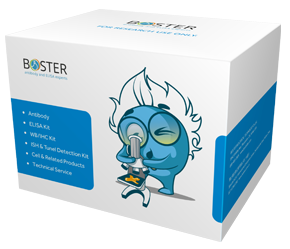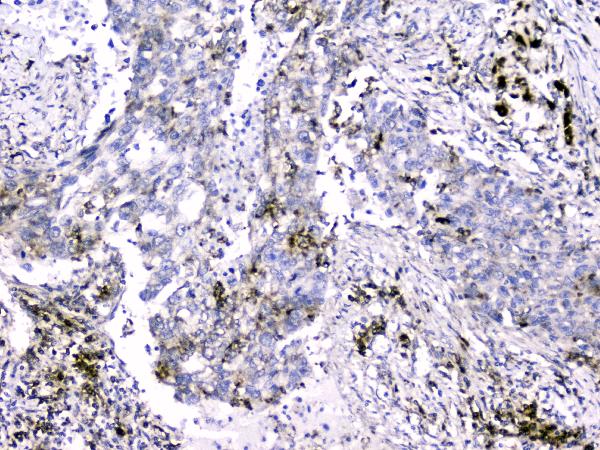Product Info Summary
| SKU: | M03529-Dyl488 |
|---|---|
| Size: | 100 μg/vial |
| Reactive Species: | Human |
| Host: | Mouse |
| Application: | Flow Cytometry |
Customers Who Bought This Also Bought
Product info
Product Name
Anti-Human Cytochrome C DyLight® 488 conjugated CYCS Antibody(monoclonal, 15F10)
View all Cytochrome c Antibodies
SKU/Catalog Number
M03529-Dyl488
Size
100 μg/vial
Form
Liquid
Description
Boster Bio Anti-Human Cytochrome C DyLight® 488 conjugated CYCS Antibody (monoclonal, 15F10) catalog # M03529-Dyl488. Tested in Flow Cytometry applications. This antibody reacts with Human.
Storage & Handling
At -20°C for one year from date of receipt. Avoid repeated freezing and thawing. Protect from light.
Cite This Product
Anti-Human Cytochrome C DyLight® 488 conjugated CYCS Antibody(monoclonal, 15F10) (Boster Biological Technology, Pleasanton CA, USA, Catalog # M03529-Dyl488)
Host
Mouse
Contents
Each vial contains 50% glycerol, 0.9% NaCl, 0.2% Na2HPO4, 0.02% NaN3.
Clonality
Monoclonal
Clone Number
15F10
Isotype
Mouse IgG1
Immunogen
E.coli-derived human Cytochrome C recombinant protein (Position: G2-E105). Human Cytochrome C shares 91% amino acid (aa) sequence identity with both mouse and rat Cytochrome C.
*Blocking peptide can be purchased. Costs vary based on immunogen length. Contact us for pricing.
Cross-reactivity
No cross-reactivity with other proteins.
Reactive Species
M03529-Dyl488 is reactive to CYCS in Human
Reconstitution
Observed Molecular Weight
39 kDa
Calculated molecular weight
11.605kDa
Background of Cytochrome c
CYCS is also known as CYC, HCS or THC4. This gene encodes a small heme protein that functions as a central component of the electron transport chain in mitochondria. The encoded protein associates with the inner membrane of the mitochondrion where it accepts electrons from cytochrome b and transfers them to the cytochrome oxidase complex. This protein is also involved in initiation of apoptosis. Mutations in this gene are associated with autosomal dominant nonsyndromic thrombocytopenia. Numerous processed pseudogenes of this gene are found throughout the human genome.
Antibody Validation
Boster validates all antibodies on WB, IHC, ICC, Immunofluorescence, and ELISA with known positive control and negative samples to ensure specificity and high affinity, including thorough antibody incubations.
Application & Images
Applications
M03529-Dyl488 is guaranteed for Flow Cytometry Boster Guarantee
Assay Dilutions Recommendation
The recommendations below provide a starting point for assay optimization. The actual working concentration varies and should be decided by the user.
Flow Cytometry (Fixed), 1-3μg/1x106 cells
Validation Images & Assay Conditions

Click image to see more details
Boster Kit Box
Protein Target Info & Infographic
Gene/Protein Information For CYCS (Source: Uniprot.org, NCBI)
Gene Name
CYCS
Full Name
Cytochrome c, somatic
Weight
11.605kDa
Superfamily
cytochrome c family
Alternative Names
Cytochrome c; CYCS; CYC Cycs|cytochrome c, somatic|cytochrome c, somatic
*If product is indicated to react with multiple species, protein info is based on the gene entry specified above in "Species".For more info on CYCS, check out the CYCS Infographic

We have 30,000+ of these available, one for each gene! Check them out.
In this infographic, you will see the following information for CYCS: database IDs, superfamily, protein function, synonyms, molecular weight, chromosomal locations, tissues of expression, subcellular locations, post-translational modifications, and related diseases, research areas & pathways. If you want to see more information included, or would like to contribute to it and be acknowledged, please contact [email protected].
Specific Publications For Anti-Human Cytochrome C DyLight® 488 conjugated CYCS Antibody(monoclonal, 15F10) (M03529-Dyl488)
Hello CJ!
M03529-Dyl488 has been cited in 9 publications:
*The publications in this section are manually curated by our staff scientists. They may differ from Bioz's machine gathered results. Both are accurate. If you find a publication citing this product but is missing from this list, please let us know we will issue you a thank-you coupon.
Pioglitazone improves mitochondrial function in the remnant kidney and protects against renal fibrosis in 5/6 nephrectomized rats
pH-sensitive micelles for the intracellular co-delivery of curcumin and Pluronic L61 unimers for synergistic reversal effect of multidrug resistance
Anti-Tumor Effects of Atractylenolide-I on Human Ovarian Cancer Cells
Catalpol inhibits apoptosis in hydrogen peroxide-induced cardiac myocytes through a mitochondrial-dependent caspase pathway
Methacryloxylethyl Cetyl Ammonium Chloride Induces DNA Damage and Apoptosis in Human Dental Pulp Cells via Generation of Oxidative Stress
N-Acetyl Cysteine Depletes Reactive Oxygen Species and Prevents Dental Monomer-Induced Intrinsic Mitochondrial Apoptosis In Vitro in Human Dental Pulp Cells
Guo X, Fu Y, Wang Z, Wang T, Li C, Huang T, Gao F, Li C. Oxid Med Cell Longev. 2018 Mar 25;2018:4950705. doi: 10.1155/2018/4950705. eCollection 2018. Di-2-pyridylhydrazone Dithiocarbamate Butyric Acid Ester Exerted Its Proliferative Inhibition aga...
Ban Jb, Fan Xw, Huang Q, Li Bf, Chen C, Zhang Hc, Xu Sq. Plos One. 2014 May 16;9(5):E97607. Doi: 10.1371/Journal.Pone.0097607. Ecollection 2014. Mono-(2-Ethylhexyl) Phthalate Induces Injury In Human Umbilical Vein Endothelial Cells.
Xu S, Liu J, Zhang Y, Wang C, Wang J, Yang Y, Huo J, Sun W. Neural Regen Res. 2012 Jun 15;7(17):1318-24. Doi: 10.3969/J.Issn.1673-5374.2012.17.006. Apoptosis-Related Protein Expression In Rabbits With Blast Brain Injury Following Early Hyperbaric ...
Recommended Resources
Here are featured tools and databases that you might find useful.
- Boster's Pathways Library
- Protein Databases
- Bioscience Research Protocol Resources
- Data Processing & Analysis Software
- Photo Editing Software
- Scientific Literature Resources
- Research Paper Management Tools
- Molecular Biology Software
- Primer Design Tools
- Bioinformatics Tools
- Phylogenetic Tree Analysis
Customer Reviews
Have you used Anti-Human Cytochrome C DyLight® 488 conjugated CYCS Antibody(monoclonal, 15F10)?
Submit a review and receive an Amazon gift card.
- $30 for a review with an image
0 Reviews For Anti-Human Cytochrome C DyLight® 488 conjugated CYCS Antibody(monoclonal, 15F10)
Customer Q&As
Have a question?
Find answers in Q&As, reviews.
Can't find your answer?
Submit your question
3 Customer Q&As for Anti-Human Cytochrome C DyLight® 488 conjugated CYCS Antibody(monoclonal, 15F10)
Question
My boss were content with the WB result of your anti-Human Cytochrome C DyLight® 488 conjugated antibody(monoclonal, 15F10). However we have seen positive staining in bone marrow mitochondrion intermembrane space. using this antibody. Is that expected? Could you tell me where is CYCS supposed to be expressed?
Verified Customer
Verified customer
Asked: 2019-11-11
Answer
From what I have seen in literature, bone marrow does express CYCS. Generally CYCS expresses in mitochondrion intermembrane space. Regarding which tissues have CYCS expression, here are a few articles citing expression in various tissues:
Amygdala, Pubmed ID: 17974005
Bone marrow, Brain, Kidney, Lung, Skeletal muscle, Skin, Testis, and Urinary bladder, Pubmed ID: 15489334
Cerebellum, Pubmed ID: 14702039
Erythroleukemia, Pubmed ID: 23186163
Heart, Pubmed ID: 13933734, 14063298, 9515723
Liver, Pubmed ID: 24275569
Boster Scientific Support
Answered: 2019-11-11
Question
We have been able to see staining in human kidney. Are there any suggestions? Is anti-Human Cytochrome C DyLight® 488 conjugated antibody(monoclonal, 15F10) supposed to stain kidney positively?
B. Edwards
Verified customer
Asked: 2018-11-27
Answer
From what I have seen in literature kidney does express CYCS. From what I have seen in Uniprot.org, CYCS is expressed in heart, cerebellum, amygdala, bone marrow, brain, kidney, lung, skeletal muscle, skin,
rc testis urinary bladder, erythroleukemia, liver, among other tissues. Regarding which tissues have CYCS expression, here are a few articles citing expression in various tissues:
Amygdala, Pubmed ID: 17974005
Bone marrow, Brain, Kidney, Lung, Skeletal muscle, Skin, Testis, and Urinary bladder, Pubmed ID: 15489334
Cerebellum, Pubmed ID: 14702039
Erythroleukemia, Pubmed ID: 23186163
Heart, Pubmed ID: 13933734, 14063298, 9515723
Liver, Pubmed ID: 24275569
Boster Scientific Support
Answered: 2018-11-27
Question
We are currently using anti-Human Cytochrome C DyLight® 488 conjugated antibody(monoclonal, 15F10) M03529-Dyl488 for human tissue, and we are well pleased with the Flow Cytometry results. The species of reactivity given in the datasheet says human. Is it possible that the antibody can work on canine tissues as well?
K. Jackson
Verified customer
Asked: 2015-01-20
Answer
The anti-Human Cytochrome C DyLight® 488 conjugated antibody(monoclonal, 15F10) (M03529-Dyl488) has not been tested for cross reactivity specifically with canine tissues, though there is a good chance of cross reactivity. We have an innovator award program that if you test this antibody and show it works in canine you can get your next antibody for free. Please contact me if I can help you with anything.
Boster Scientific Support
Answered: 2015-01-20




